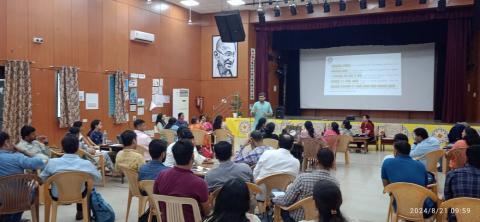
This is the time for midterm exams in most schools, and it’s also when many students seek extra support for their learning. However, only a few privileged students have access to extra help from their families or can afford private tuition. For most students attending government schools, they often feel helpless when faced with a difficult concept or question they don’t understand during preparation. Their only option is to wait until the next school day when they might get a chance to ask their teachers.
With AI tools, this is no longer a problem. There are countless solutions available on YouTube and other sites, but AI tools are particularly helpful because they are specific and can customize responses. For example, if a 9th-grade student from a government school in Delhi writes a prompt like, “I am a 9th-grade student preparing for exams. Can you explain the five reasons for the French Revolution? This question is worth 5 marks and needs to be written in 200 words,” AI can provide an accurate and tailored response. Before AI, online resources could not cater to such specific needs. What’s even more fascinating is that AI tools can respond to voice commands and provide answers in both text and voice formats, along with pictures, maps, and diagrams.
In my recent interactions with teachers and students before exam time, I encouraged students to view AI as personal support and demonstrated how it works. During our discussions, we came to an understanding: knowing is now more accessible than ever, and ignorance is a choice—at least for those with access to smartphones and the internet. I’m fully aware that this is not a reality for every child in India, as millions lack access to these resources. However, for those who do, there has never been a more favorable time for learning. With so many resources available, particularly individualized support, learning is obvious. Just like sweating in the summer is obvious unless you have air conditioning, ignorance is now a choice—one that requires effort and resources to avoid. When I ask children, “Who wants to choose ignorance?” I don’t see a single hand raised. After all, who wants to remain ignorant?
Learning and knowing are intrinsic to human nature; it takes schooling to sabotage this natural inquisitiveness. Understanding the world around us gives us better control over our lives and circumstances. This is why most people fear darkness in unfamiliar places: it causes a loss of control, making decision-making difficult and creating an existential threat. Light, on the other hand, allows us to assess our surroundings and navigate accordingly. Knowledge is like that light. We are all intrinsically motivated to learn because it gives us better control over our lives.
AI tools have made it easier for all of us to access this information. For those with access to AI tools, it’s no less than a golden era. However, all great advancements come with challenges. The biggest challenges in smartphone-dependent learning are distraction and surveillance. Every minute spent on a smartphone is recorded, creating massive data points that allow companies to profile us. Those who can profile us can also control us. While this issue is somewhat hidden, the more obvious challenge is distraction. Who hasn’t picked up their phone for a specific task only to spend hours scrolling through reels? It happens to almost everyone. So, this golden opportunity for learning comes wrapped in distraction and surveillance. But do we have a choice?
Hegemonic technology doesn’t offer much choice, but the only way forward is to adapt, take control of the situation, and wherever possible, remove the distractions and surveillance to access the pure gold—the individualized opportunity for learning. Never before on this planet have we had such widespread resources for learning, which is why I repeat: this is the era when learning is obvious, and ignorance is a choice. After all, who would choose ignorance?
- Log in to post comments
